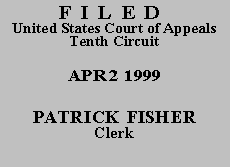

| RICHARD M. SNELL,
Plaintiff-Appellant, v. DAN GLICKMAN, Secretary of the Department of Agriculture for the United States of America, Defendant-Appellee. |
|
Plaintiff Richard M. Snell appeals from the district court's judgment affirming an administrative decision by the United States Department of Agriculture denying his claim under the Federal Crop Insurance Act. Our review of an agency's actions, which is the same as that performed by the district court and to whose decision we owe no deference, see Valley Camp of Utah, Inc. v. Babbitt, 24 F.3d 1263, 1267 (10th Cir. 1994), is narrow, and we afford substantial deference to an administrative agency acting in compliance with its statutory obligations. See Phillips Petroleum Co. v. Lujan, 951 F.2d 257, 259 (10th Cir. 1991). Thus, we will not set aside agency action unless it is "'arbitrary, capricious, an abuse of discretion, or otherwise not in accordance with law.'" Id. (quoting 5 U.S.C. § 706(2)(A)).
Mr. Snell operates a dry land wheat farm in Curry County, New Mexico. In the fall of 1994, this area of New Mexico had been under drought conditions for three to four years. After determining that the moisture level in his soil was very low, he decided not to plant a wheat crop that fall because the lack of soil moisture would likely cause the crop to "blow out" (not mature), which would in turn cause his land to suffer wind erosion. Mr. Snell's neighbors did plant that fall, and their crops did in fact "blow out," resulting in severe wind erosion to their land.
Mr. Snell applied to recover benefits from his wheat insurance on the basis that the drought prevented him from planting his wheat crop. The Small Grains Crop Insurance program in which he participated provided coverage in certain circumstances for "prevented plantings," defined in part as the inability "to plant the insured crop due to an insured cause of loss that is general in the area (i.e., most producers in the surrounding area are unable to plant due to similar insurable causes)." 7 C.F.R. § 457.101.1(p) (1995) (emphasis added). He conceded that he had been physically able to plant a crop, but argued that in light of the drought conditions, good land conservation practices dictated that he not plant.
The local Farm Service Agency denied his claim, and he appealed to the Department of Agriculture's National Appeals Division. Following a hearing, the hearing officer found that the drought conditions qualified as an insurable cause of loss, but that his "concern for conservation of the land was secondary in respect to the terms of the crop insurance policy." Appellee's Suppl. App. at 6. The hearing officer upheld the denial of his claim because she concluded that, since his neighbors were able to and did plant, he did not meet the insurance criteria for "prevented plantings." See id. The hearing officer's decision was upheld in a subsequent agency appeal, and Mr. Snell then brought this action.
In challenging the decision denying his insurance claim, Mr. Snell does not dispute the hearing officer's factual findings, and he essentially admits that his failure to plant did not meet the "prevented planting" requirement of the program because he did not plant when his neighbors did. His contention on appeal is that the "prevented planting" provision is unreasonable because it requires him to violate sound conservation practices--because his neighbors do--to be eligible to recover under the crop insurance program.
These insurance provisions were promulgated as regulations through statutory authority conferred by Congress, see Federal Crop Ins. Corp. v. Merrill, 332 U.S. 380, 384 (1947), and we must give effect to such regulations so long as they are based on reasonable interpretations of statutory authority, see Chevron, U.S.A., Inc. v. Natural Resources Defense Council, Inc., 467 U.S. 837, 843-44 (1984). While in hindsight in this particular case, the neighbors' decisions to plant may have been unwise from a conservation standpoint, Mr. Snell has not demonstrated that the insurance program's general reliance on what other farmers do as a measure for determining whether planting is "prevented" is unreasonable or not in accordance with law. He also has not demonstrated that the hearing officer misinterpreted or misapplied this provision in assessing his claim. We therefore agree with the district court that he has not shown that the decision to deny his insurance claim was error.
The judgment of the district court is AFFIRMED. The mandate shall issue forthwith.
Entered for the Court
Circuit Judge
*. This order and judgment is not binding precedent, except under the doctrines of law of the case, res judicata, and collateral estoppel. The court generally disfavors the citation of orders and judgments; nevertheless, an order and judgment may be cited under the terms and conditions of 10th Cir. R. 36.3.